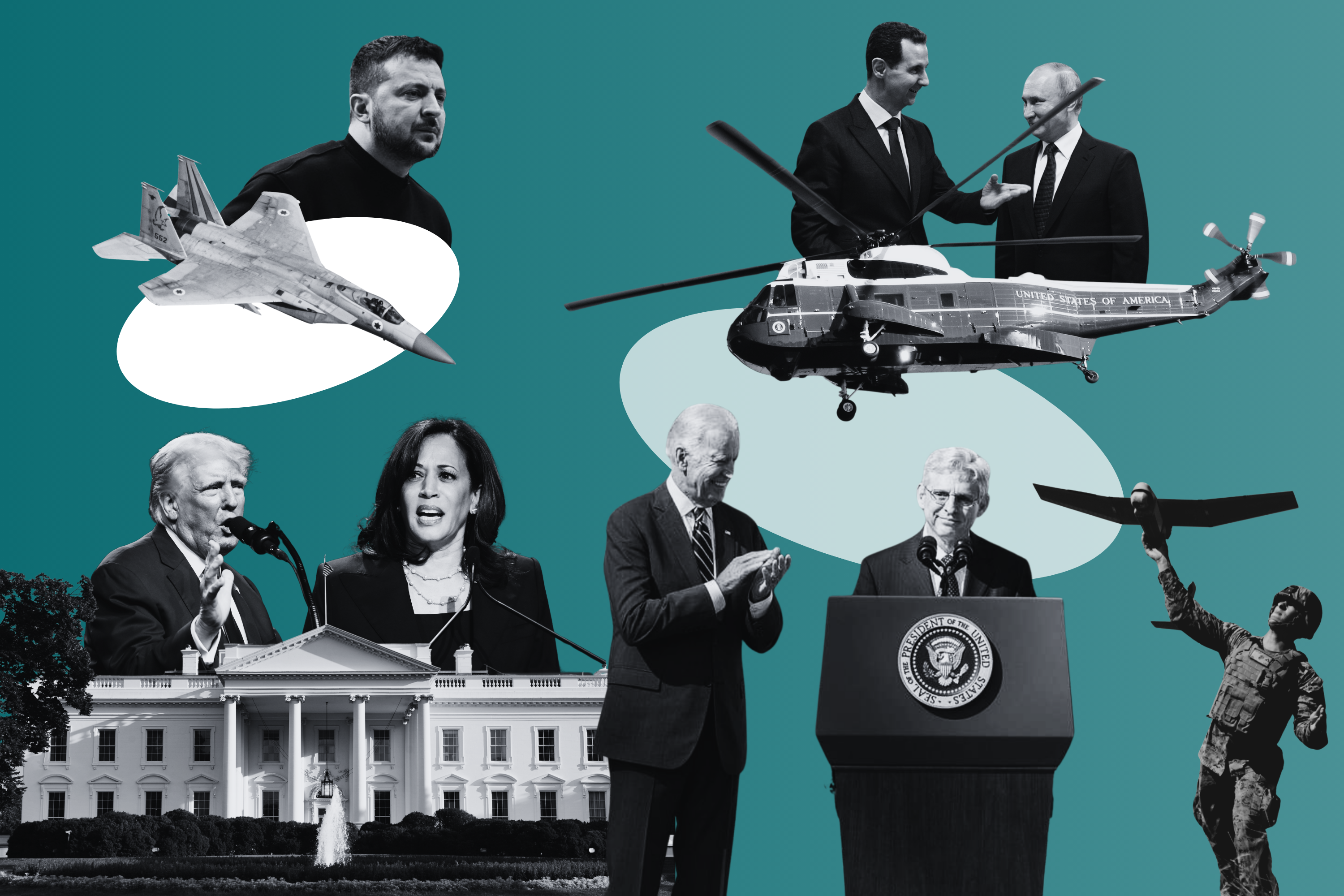Published by The Lawfare Institute
in Cooperation With

Event Announcements (More details on the Events Calendar)
We interrupt your regularly scheduled Lawfare Event Calender to bring you: The Future of Civilian Robotics. Monday, September 15th at 2 pm: Governance Studies at Brookings will hold a forum focused on the constantly changing landscape of civilian robotics in the United States. Brookings Senior Fellow Benjamin Wittes will moderate a conversation between Brookings Fellow in National Security Law Well C. Bennett, Brookings Nonresident Fellow John Villasenor, and Pepperdine University School of Law Professor Gregory McNeal on the differing aspects of legal and regulatory policy surrounding civilian robotics. After the program, the panelists will take audience questions. You can find more information here.
Monday, September 15th at 8:30 am: The Center for Strategic and International Studies will review Japanese Perspectives on China, Taiwan, and Cross-Strait Relations. The event will have four panels: "The Japan-Taiwan Relationship in the Post-Democratiz
Monday, September 15th at 9:30 am: With only months left to reach a comprehensive nuclear deal, the Carnegie Endowment for International Peace will host a conversation on Squaring the Iranian Nuclear Circle: Defining Uranium Enrichment Capacity and Other Key Issues. At the event, the Arms Control Association will present its new proposal, developed in coordination with the International Crisis Group. Panelists include Kelsey Davenport, James Walsh, Paul Pillar and Daryl G. Kimball. You can find more information here.
Monday, September 15th at 9:30 am: The Center for Strategic and International Studies will host a dialogue on Cooperation to Counter 21st Century Maritime Domain Challenges. From the Baltic and Mediterranean Seas to the South China Sea, how do nations confront these challenges at a time when national defense budgets are shrinking and operational demands are increasing? How do new operational requirements, like an increasingly ice-free Arctic Ocean, factor into maritime strategies? Following the outcomes of the recent NATO Summit, our three speakers will address how a network of navies works together to address current and future maritime security challenges. The event will feature Admiral Michelle Howard, Vice Admiral Axel Schimpf, Rear Admiral Lars Saunes, and Heather A. Conley. RSVP here.
Monday, September 15th at 11 am: The Atlantic Council will also hold a post-op discussion of the NATO Summit, entitled After the Summit: General Phillip M. Breedlove on NATO's Path Forward. General Breedlove, Supreme Allied Commander, will offer his perspective on the deliverables of the 2014 NATO Summit in Wales. For more information, contact event coordinator Alex Ward (award@atlantic
Tuesday, September 16th at 10 am: There are now more than three million Syrian refugees seeking protection and survival in the region. Solutions to the bloody conflict appear more distant than ever and it is likely that the refugees will not be able to return to their homes in the near future. In Syria itself, over six million people have been displaced. Join the Brookings-LSE Project on Internal Displacement and the Office of the United Nations High Commissioner for Refugees (UNHCR) for a conversation on Syria’s Displacement: Views from the Region. Speakers will include Carol Batchelor of UNHCR Turkey, Brian Hansford of UNHCR and Andrew Tabler of the Washington Institute for Near East Policy. Elizabeth Ferris, senior fellow and co-director of the Brookings-LSE Project on Internal Displacement will moderate the event and offer opening remarks. Register to attend here.
Tuesday, September 16th at 12 pm: The American Security Project will host Undersecretary Richard Stengel in a conversation on American Public Diplomacy in 2014 and Beyond. In a time when the actions of foreign publics are changing political and security landscapes, the need for effective public diplomacy is becoming more urgent. Understanding this need, how should the U.S. best build relationships and influence with target audiences overseas? RSVP here.
Tuesday, September 16th at 1 pm: At Georgetown University's Berkley Center for Religion, Peace, and World Affairs, a panel of scholars will discus Jocelyne Cesari's new book, The Awakening of Muslim Democracy, Religion, Modernity and the State, which challenges the view iew that political Islam is limited to opposition movements against the "secular" states. The book also demonstrates that democracy, modernization, and secularization do not always go hand-in-hand. RSVP here.
Tuesday, September 16th at 5:15 pm: The Atlantic Council invites you to a conversation with Mathew Burrows about his new book, The Future, Declassified: Megatrends That Will Undo the World Unless We Take Action, detailing the long-term challenges faced by the United States and what actions the United States must take if we are to continue to prosper. Edward Luce will moderate the discussion.
Wednesday, September 17th at 12 pm: The Center for Strategic & International Studies invites you to a discussion on The Role of Independent Regulatory Agencies in Improving Cybersecurity. Julie Brill will deliver a keynote address. Afterwards, Valerie Abend, Jacob Olcott, Joseph H. McClelland, and Rear Admiral (ret.) David Simpson will speak on a panel. Register here.
Thursday, September 18th at 5 pm: Join Georgetown University's China Studies Speakers Series for an event entitled China in the Age of Ambition: Chasing Fortune, Truth, and Faith. For more information, register here.
Friday, September 19th at 9 am: After the surveillance disclosures by Edward Snowden in 2013, government officials and other public figures in Europe and elsewhere have been proposing changes that qualify as attempts to gain “technological sovereignty." The New America Foundation will host an event entitled Digital Borders and Technological Sovereignty : Breaking or Saving the Internet as We Know It? to take stock of the current state of this debate and its implications. The panel will feature Alan Davidson, Thorsten Benner, Ansgar Baums, Joseph Nye, Carolina Rossini and Tim Maurer as speakers. You can find more information here.
Friday, September 19th at 12:30 pm: Freedom House will host Douglas Schoen to discuss his new book, The Russia-China Axis. He sees the United States as a nation in crisis, rendered nearly impotent by ongoing partisan warfare and unprepared to face an unprecedented partnership developing between Russia and China and argues that only a rebirth of American global leadership can counter the corrosive impact of this antidemocratic alliance. For more information, see the Freedom House event announcement.
Employment Announcements (More details on the Job Board)
Military and Technical AdviserORGANIZATION: International Committee of the Red Cross LOCATION: Geneva DEADLINE: September 30, 2014 STARTING DATE: November 1, 2014The Arms Unit of the Legal Division has an opening for a Military and Technical Adviser in Geneva (male or female) – 100% occupancy rate
Purpose of the post
The Arms Unit of the ICRC’s Legal Division serves the ICRC objectives in the legal, operational and communications fields by the provision of expertise and analysis, from a humanitarian perspective, on arms and weapons-related technology employed in armed conflict and other situations of violence. The unit represents ICRC policy and positions in multilateral for on arms and international humanitarian law. It also supports ICRC operational, legal and communications work by providing or coordinating the provision of technical, legal, medical/health and policy analysis on weapons used in armed conflicts and other situations of violence and on relevant scientific advances.
The Military and Technical Adviser plays a key role in the achievement of institutional objectives in the field of arms and international humanitarian law. The incumbent contributes military and technical expertise to the ICRC’s policy, legal and operational responses to arms issues arising from ICRC field experience and new scientific and technological developments. The incumbent will also have primary responsibility for at least one major file of the Arms Unit. The post reports to the Head of the Arms Unit in the Legal Division of the ICRC.
Main responsibilities
Training and experience required
- Advise and contribute military and technical analysis on a range of arms issues being addressed by the Arms Unit (e.g. use of explosive weapons in populated areas; cluster munitions; anti-personnel and anti-vehicle mines; incendiary weapons; operationalization of the Protocol on Explosive Remnants of War; remote-controlled, automated and autonomous weapons) and on issues pertaining to the conduct of hostilities carried out within the Legal Division.
- Contribute to legal and operational analysis of issues arising from the deployment of specific weapons with armed forces in armed conflict and other situations of violence including peacekeeping and law enforcement. Provide military and technical analysis to ICRC units and delegations in response to the use of specific weapons and methods of warfare in armed conflicts and law enforcement situations.
- Maintain and develop links between the ICRC’s arms unit and relevant military and technical experts and organisations.
- Develop “fact sheets” presenting the military role, technical details and anticipated humanitarian impacts of a range of weapons.
- Provide additional capacity for research, writing, representation and outreach to internal and external audiences on arms issues.
- Represent ICRC views and positions in a variety of external fora.
- Provide expertise on means of identification for medical transports in accordance with the relevant provision of international humanitarian law.
- Serve as the institutional focal point for the International Telecommunications Union.
Skills and qualifications
- Advanced military training and service with in-depth knowledge of targeting procedures and conventional weapons including explosive munitions. Good knowledge of arms control regimes is an advantage.
- A degree in the physical sciences (e.g. physics, engineering) and/or military disciplines.
- Knowledge of the general rules of international humanitarian law, in particular in relation to the conduct of hostilities. Specialised training in international humanitarian law and/or international relations is an asset.
- Professional experience working in multilateral processes, preferably in the arms field is an advantage.
- Field experience with the ICRC or another humanitarian organisation is an asset.
Minimum length of assignment: 2 years (extendable)
- Excellent analytical and political judgement.
- Excellent oral and written English, the capacity to work in French. Additional languages are an advantage.
- Good communication skills.
- Openness to dialogue and good interpersonal skills.
- Strong motivation and aptitude for work within a highly integrated team.
Starting date: 1 November 2014
If this post interests you and you meet the requirements set out above, please send your application by the 30th of September 2014 at the latest, to application_hq@icrc.org mentioning “DC/JUR/ARMES - Application – Military & Technical Adviser” in the subject of your message. Only applications via this e-mail will be considered for this campaign. If you don’t receive a reply to your application within one month, please consider that your file has not been shortlisted.





